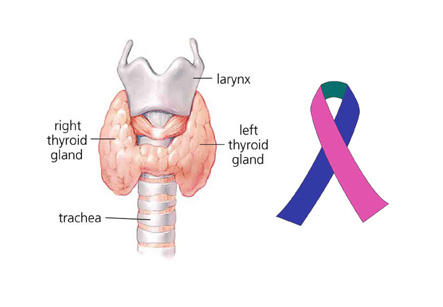Thyroid Cancer
Introduction
Thyroid is a butter-fly shaped gland located in front neck and responsible for secretion of different types of thyroid hormones namely thyroxine, triiodothyronin etc. Thyroid surgery is indicated hyperthyroidism, thyroid nodules, thyroid cancer etc.
Procedure and considerations:
Surgery is considered in cases of following conditions:
• A non-cancerous mass that obstructs breathing and swallowing
• Confirmed or suspected cases of thyroid cancer
• Uncontrolled hyperthyroidism with medicines.
• Recurrence of cystic mass in thyroid gland
Surgical removal thyroid gland is called thyroidectomy. Before surgery the patient’s general health is checked with routine blood tests, chest X rays etc. Thyroid surgery is usually performed under general anesthesia. Patient is asked to fast for at least 6 to 8 hours before surgery. Once on the surgery table the neck is exposed and cleaned with an antiseptic lotion after which sterile surgical drapes are placed. An incision is made through the skin in front of the neck. The muscles and other tissues are pulled aside and held apart with instruments. Next the thyroid gland is exposed and removed by careful dissection. The neck contains many important nerves and blood vessels. Surgery requires great skill and precision and is usually major.
After the patient is discharged regular health checkups are essential to detect recurrence and to ensure restoration of normal life.

In total thyroidectomy the entire gland with lymph nodes are dissected out. In thyroid lobectomy only one affected lobe is removed. The isthmus or the connecting bridge between the two lobes, may be removed along with it. In subtotal thyroidectomy one complete lobe along with isthmus and part of the other lobe is removed. The dissected thyroid and the surrounding lymph nodes are then sent to the pathologist to be evaluated under microscope to detect any evidence of malignancy or cancer.
Successful thyroidectomy can remove the entire cancerous tissue. Once the surgery is complete the incision is sutured or stapled. Before closure a small tube is placed to drain out excess fluids. The wound is then dressed. Patient’s vital parameters like pulse rate, blood pressure and EKG are continuously monitored before, during and after surgery. He or she is then sent to the recovery room. Pain medication and antibiotics may be needed after surgery.
It is a relatively safe surgery but is associated with some complications. Hoarseness of voice may occur if the nearby nerve is inadvertently damaged. If parathyroid gland is mistakenly removed hypoparathyroidim may occur. Parathyroids are amall button like organs over the thyroid. They are linked to the body’s calcium metabolism.
In case of total thyroidectomy patient will develop hypothyroidism. This means there is deficiency of thyroid hormones that are essential for normal functioning of the body. In this case replacement therapy with thyroid hormone tablets is advised.
Following completion of surgery patient needs to stay in hospital for a few days. Recovery usually depends on general health, age of the patient, nature of the disease and type of surgery. After the patient is discharged regular health checkups are essential to detect recurrence and to ensure restoration of normal life. Follow up treatment with chemotherapeutic drugs and radiation therapy is essential in some patients with thyroid cancer to prevent recurrence and spread of cancer.